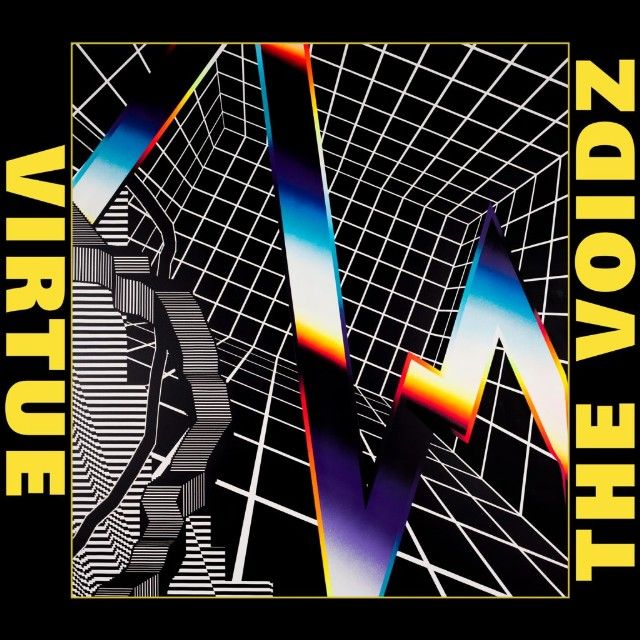The Voidz release full-length ‘Virtue’

The Voidz
Virtue
RCA Records · March 30, 2018
On The Voidz’ sophomore album Virtue, Julian Casablancas’ named has been erased from the band —but the music has it written all over it. Almost ten years ago, Casablancas released his first solo album, Phrazes for the Young, which was full of synths and new wave influences. It was the first time we saw that he had slightly weirder tendencies, perhaps, than what he released with The Strokes, but also that he has a deep appreciation for pop. Five years later, Julian Casablancas + The Voidz released the rough, experimental Tyranny, an album that featured Casablancas completely letting go of any concern for what would sound normal or poppy, and basically just going crazy (in the best way possible).
Now, four years after Tyranny, the Voidz – having “initiated” Julian Casablancas and absorbed his name into theirs – have released Virtue, and the difference in the name is actually a good indicator of the differences between the two albums. As someone who has a pretty deep love and appreciation for all of Casablancas’ music, I can say with confidence that this record is decidedly, extremely Julian. One of my favorite things about it is that it sounds like a marriage of all of the eras of Julian’s artistic identity: The Strokes, his earlier solo work, and his most recent work with the Voidz. No, the album isn’t as consistent, concise, or cohesive as it could be, and the songs aren’t without fault; but we do without a doubt get a ton of creativity and variety on Virtue, with a comfortable mix of nostalgia and newness.
As soon as the first track ‘Leave It In My Dreams’ started, I felt like I was at home, as a lifelong fan of The Strokes. Upon hearing the sweet, high-register guitar of the intro, there is no denying its inspiration from Julian’s past work. It’s an approachable, psychedelic indie pop song, which is already a departure from the previous album. In the first verse, Julian sings, “Don’t overthink it,” which may be a good representation of why Virtue could commercially have a leg up on Tyranny. It has the same rawness and strangeness that Casablancas seems to crave in his newest music, but has been reined in significantly more than its predecessor.
‘QYURRYUS,’ the second track, is a slightly ominous-sounding “Cyber-Arabic-Prison-Jazz” song, as described by the Voidz themselves. In theory, it shouldn’t be good, with its droning synth bass, screechy guitar, and gratuitous auto-tune vocal solos. But somehow, the end product is extremely intriguing, slightly mysterious, and keeps pulling you back for another listen. The third track, ‘Pyramid of Bones,’ brings some of the band’s politics into focus, with lyrics like “Murder in the name of national security,” and “Don’t you ever listen to the white man’s lies,” set to head-banging guitar and drums in the chorus. ‘All Wordz Are Made Up’ comes at the album’s halfway point, and is one of the best tracks on the album. It’s unexpectedly upbeat and fun, with funky, tropical percussion and rich synths juxtaposed with odd robotic harmonized vocals. It has elements of lots of different genres and time periods, and blends them all remarkably successfully.
Virtue hits a definite lull a little after the halfway point, with a much higher concentration of “okay” songs than ones that I loved. ‘My Friend The Walls’ and ‘Pink Ocean’ are mostly downers, with not enough dynamics to redeem their sadness, save for the former’s slightly catchy chorus. ‘Black Hole’ and ‘We’re Where We Were’ both suffer from garbage production (although I have a feeling this is intentional, it doesn’t work well enough) and sound more like they’re making fun of political punk than actual examples of the genre. These songs, as well as some other choice lines scattered throughout the album, suffer slightly from Julian’s undeniable, somewhat endearing pretentiousness, a kind of “wake up sheeple” attitude, and could have easily been left off the album.
The closer song, ‘Pointlessness,’ is a sleepy, spacey, existentialist or nihilistic tune, with the repeated line “What does it matter?” It’s very pretty and calming, and is one of the shining moments of the softer side of Casablancas’s vocals. The lyrics “I believe that / You’re gonna be forgotten / Any day now” gain more meaning once you notice the connection to The Strokes lyrics from fifteen years ago (wow, cue the “feel old yet?” memes) opening Room on Fire, “I wanna be forgotten / And I don’t wanna be reminded.” Lots of small lines throughout this album, as well as the band’s name change, indicate a desire of Julian Casablancas to, essentially, be forgotten, at least as the superstar we know him as. This has perhaps been the case since those early lyrics were written, but now more than ever, Julian seems to be striving for a lack of individual fame. I can’t say whether this will be the case, or whether it would be a good thing, but I do think that Virtue is a good indicator that anything Julian Casablancas has a part in making will have the mark of his creative ingenuity and slightly eccentric tendencies. He’s a little out there, a bit out of control at times, but you’ve got to love it.